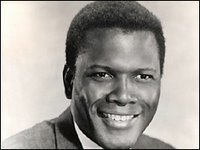Sidney Poitier

1924 -
American born Miami, Florida
Height 6' 2½" (1.89 m) . A native of Cat Island, The Bahamas, (though born in Miami during a mainland visit by his parents), Poitier grew up in poverty as the son of a dirt farmer. He had little formal education and at the age of 15 was sent to Miami to live with his brother, in order to forestall a growing tendency toward delinquency. In the U.S., Poitier first experienced the racial chasm that divides the country, a great shock to a boy coming from a society with a black majority. A determination to find and create opportunities for blacks was born in him because of the poor treatment he received on the streets of Miami. At 18, he went to New York, did menial jobs and slept in a bus terminal toilet. A brief stint in the Army as a worker at a veteran's hospital was followed by more menial jobs in Harlem. An impulsive audition at the American Negro Theatre was rejected so forcefully that Poitier dedicated the next six months to overcoming his accent and performance ineptness. On his second try, he was accepted. He was spotted in a rehearsal and given a bit part in a Broadway production of "Lysistrata," for which he got excellent reviews. By the end of 1949, he was having to choose between leading roles on stage and an offer to work for Darryl F. Zanuck in the film No Way Out (1950). Poitier's performance as a doctor treating a white bigot got him plenty of notice and led to more roles, each considerably more interesting and prominent than most black actors of the time were getting. Nevertheless, the roles were still less interesting and prominent than those white actors routinely obtained. But seven years later, after turning down several projects he considered demeaning, Poitier got a number of roles that catapulted him into a category rarely if ever achieved by a black man of that time, that of starring leading man. One of the films, The Defiant Ones (1958), gave Poitier his first Academy Award nomination as Best Actor. Five years later, he won the Oscar for Lilies of the Field (1963), the first black to win for a leading role. Poitier maintained activity on stage, on screen, and in the burgeoning Civil Rights movement. His roles in Guess Who's Coming to Dinner (1967) and To Sir, with Love (1967) were for their time landmarks in the breaking down of social barriers between blacks and whites, and Poitier's talent, conscience, integrity, and inherent likability placed him on equal footing with the white stars of the day. He took on directing and producing chores in the Seventies, achieving success in both arenas. Although he has reduced the frequency of his roles in recent years, he remains one of the most respected and beloved figures in American cinema of the twentieth century. Spouse Joanna Shimkus (23 January 1976 - present) 2 children, Juanita Hardy (29 April 1950 - 1965) (divorced) 4 children.
The Last Brickmaker in America (2001) , The Simple Life of Noah Dearborn (1999) , Free of Eden (1999) , David and Lisa (1998) , The Jackal (1997) , Mandela and de Klerk (1997) , To Sir, with Love II (1996) , Children of the Dust (1995) , Sneakers (1992) , Separate But Equal (1991) , Little Nikita (1988) , Shoot to Kill (1988) , A Piece of the Action (1977) , Let's Do It Again (1975) , The Wilby Conspiracy (1975) , Uptown Saturday Night (1974) , A Warm December (1973) , Buck and the Preacher (1972) , The Organization (1971) , Brother John (1971) , They Call Me MISTER Tibbs! (1970) , The Lost Man (1969) , For Love of Ivy (1968) , Guess Who's Coming to Dinner (1967) , In the Heat of the Night (1967) , To Sir, with Love (1967) , Duel at Diablo (1966) , The Slender Thread (1965) , A Patch of Blue (1965) , The Greatest Story Ever Told (1965) , The Bedford Incident (1965) , Lilies of the Field (1963) , The Long Ships (1963) , Pressure Point (1962) , Paris Blues (1961) , A Raisin in the Sun (1961) , All the Young Men (1960) , Porgy and Bess (1959) , The Defiant Ones (1958) , Virgin Island (1958) , The Mark of the Hawk (1957) , Band of Angels (1957) , Something of Value (1957) , Edge of the City (1957) , Good-bye, My Lady (1956) , "The Philco Television Playhouse" (1952) , "Kraft Television Theatre" (1955) , Blackboard Jungle (1955) , Go, Man, Go! (1954) , Red Ball Express (1952) , Cry, the Beloved Country (1951) , No Way Out (1950)


<< Home